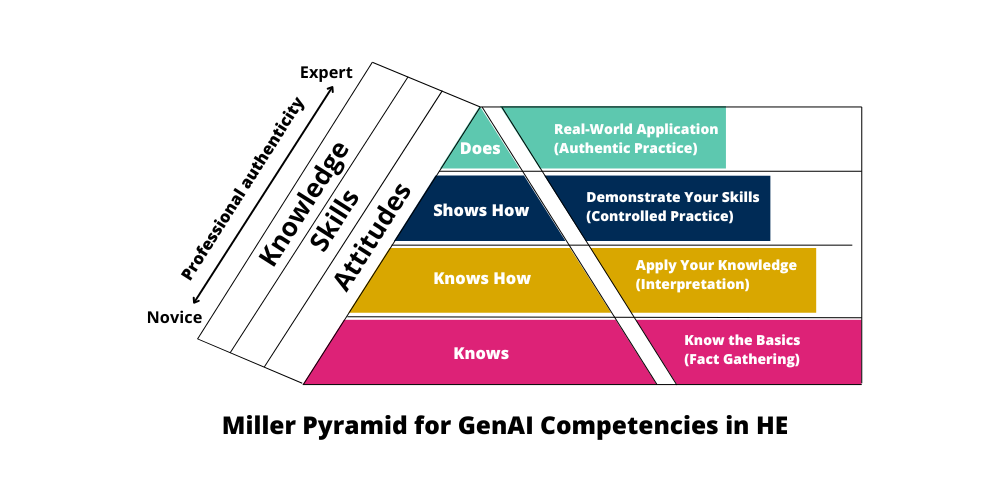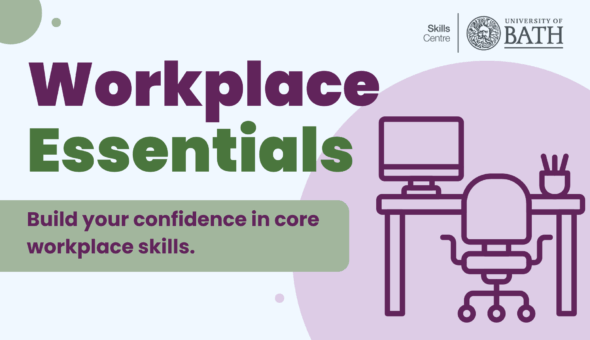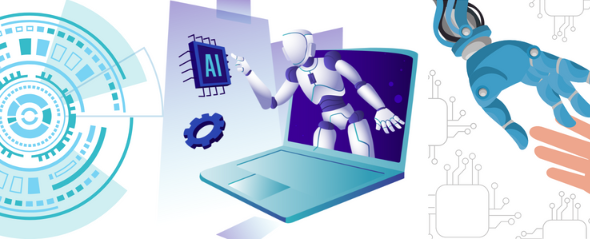Understanding our approach: Miller's Pyramid
Before we dive in, let's talk about the framework behind this guide. We're using Miller's Pyramid, a groundbreaking model originally developed by George Miller in 1990 for medical education. Developing knowledge and competencies in new technologies can be challenging, which is why this powerful framework has been adapted here to help you build structured knowledge, skills and attitudes to confidently navigate the world of Generative Artificial Intelligence (GenAI).
Think of Miller's Pyramid like a skills ladder. It shows how learning isn't just about knowing facts, but about progressively building competence, from understanding basic concepts to applying them in real-world, complex situations. Just as clinical students move from textbook knowledge to performing actual procedures, you'll move from understanding GenAI basics to becoming a sophisticated, ethical GenAI user.
Copilot: Your intellectual companion, not a shortcut
GenAI isn't a magical solution to academic challenges. It's a sophisticated tool for intellectual exploration. Think of Copilot as an intellectual sparring partner, not a task-completion robot.
What does this mean in practice?
When you engage with AI tools like Copilot, you're not just asking for answer, you're entering a dialogue that transforms your approach to learning, research, and critical thinking. For example, instead of requesting "Write me an essay on climate change," you might ask "Help me explore counterarguments on carbon taxation" or "What perspectives am I missing in my analysis of renewable energy policies?"
Imagine an AI that:
- Challenges your initial assumptions by presenting alternative viewpoints you hadn't considered.
- Helps you explore diverse perspectives by suggesting readings from different disciplines or cultural contexts.
- Stimulates deeper critical reflection by asking probing questions about your reasoning process.
- Guides you towards more nuanced arguments by highlighting complexities in seemingly straightforward issues.
Effective GenAI use isn't about getting answers. It's about asking better questions. It's a catalyst for learning that amplifies your intellectual effort, not a substitute for it. Academic integrity means using GenAI to enhance your thinking, not replace it.
When you interact with Copilot, you're not seeking a quick fix, but engaging in an active thinking partnership. It's about:
- Generating innovative ideas.
- Exploring complex concepts from multiple angles.
- Developing more sophisticated analytical skills.
- Pushing the boundaries of your own understanding.
Your four-stage GenAI competence journey
This self-directed, four-stage personal development roadmap provides a clear path to follow as you build your GenAI knowledge, skills and attitudes. Each stage builds upon the previous one, helping you progress from basic understanding to sophisticated application.
- Know the Basics (Fact Gathering)
Your action steps (to Learn):
- Explore fundamental concepts of how GenAI functions and its underlying technology.
- Research different AI tools available at Bath and their specific applications.
- Consider the ethical implications and potential biases in AI systems.
- Familiarise yourself with the University's guidelines on appropriate AI use.
Start by accessing our introductory online resources.
- Apply Your Knowledge (Interpretation)
Your action steps (to Develop):
- Practice crafting effective prompts that yield useful, targeted responses.
- Develop your critical eye for evaluating and validating AI-generated content.
- Identify appropriate contexts for GenAI use within your specific discipline.
- Master proper techniques for citing and attributing AI contributions.
Explore our self-access GenAI Module.
- Demonstrate Your Skills (Controlled Practice)
Your action steps (to Show):
- Experiment with integrating GenAI into your academic projects in meaningful ways.
- Work through ethical dilemmas involving AI use in your field.
- Document your GenAI usage with transparency and academic honesty.
- Reflect on how GenAI enhances rather than compromises your academic integrity.
Participate in our facilitated GenAI workshops.
- Real-World Application (Authentic Practice)
Your action steps (to Achieve):
- Implement GenAI as a thoughtful component in your assessments and research.
- Adapt and customise AI tools to address complex, discipline-specific challenges.
- Develop your personal framework for ethical GenAI engagement.
- Prepare for professional environments by practicing industry-relevant AI skills.
Engage effectively and ethically with using GenAI in your academic work and employment.
Three Key Dimensions to Master
- Knowledge: Understanding GenAI's capabilities and limitations
- Skills: Practical ability to use AI tools effectively
- Attitudes: Developing an ethical, critical approach to technology
Your Bath advantage
The University of Bath is committed to helping you become a responsible, skilled GenAI user. We're not just teaching you to use a tool, we're preparing you to be an innovative, ethical leader in a technology-driven world.
Getting started today
Ready to begin your GenAI journey? Here are your first steps:
- Check out our comprehensive GenAI resource in UniHub.
- Register for upcoming GenAI workshops.
- Share your experiences and best practices in the comments and join our GenAI student community.
A final word of wisdom
GenAI is powerful, but it's a tool not a replacement for your unique creativity, critical thinking, and academic integrity. Your human skills, combined with GenAI capabilities, are what will truly set you apart.
Respond



